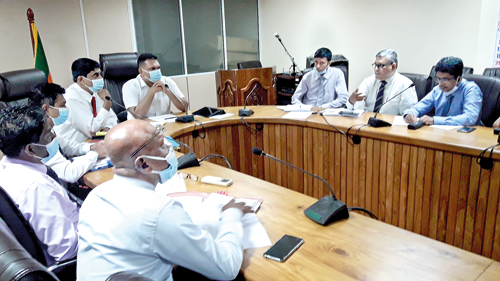Micro finance companies defend against accusations of alleged malpractices
View(s):
The committee meeting in progress
The Lanka Micro Finance Practitioners’ Association (LMFPA) said this week it was concerned over several protests and media reports over indebtedness seemingly due to alleged malpractices of microfinance institutions.
“We are concerned about these protests and media reports because they may make a serious implication on the industry as a whole. Similar media reports appeared on several occasions in the recent past and LMFPA responded to these institutions with the good intention of finding any misdoing by any of our members and rectifying them,” the association said in a media statement.
For example, there were reports that claim there had been over 200 suicides due to microfinance; the LMFPA have requested them to provide details of such suicides to verify the facts. Unfortunately, the parties that proclaim such a number of suicides due to microfinance, failed to support their claim with any specific information such as name of the dead person, when and where even when LMFPA inquired from them. One incident reported in the media from Gandara in Matara was verified by LMFPA members and found out that the death was not due to such a course and “we reported our findings to the particular media organization and received no response for that so far”. This raises the question of reliability of such unfounded statements.
The biggest concern over these issues is that well-mannered institutions’ reputations that are in the LMFPA membership are being tarnished in addition to the destruction of the entire microfinance industry. There may be loan sharks that operate in the guise of microfinance and micro credit luring many low income people into a debt trap by exploiting them. The Microfinance Institutions (MFIs) that have been in operation for a considerable period of time are not only interested in alleviation of poverty but also in social empowerment of their customers. In fact, there are thousands of customers who have grown their businesses through long association with MFIs.
Microfinance institutions suffered heavily in recent times due to factors beyond their control. The loan write-off programme implemented in 2018 by the government ended up with high NPL ratios of MFIs due to willful default of loans by large number of borrowers who were not eligible for the loan write-off.
“Easter Sunday attacks and the COVID-19 pandemic also had a shocking impact on the sustainability of MFIs. In some areas, loan distribution was disrupted due to the high non repayment rate caused not only by the abovementioned incidents but also the increase of loan sharks that carry the label of microfinance and exploit the grassroots level. The continuation of this trend will only further endanger the sustainability of the entire industry and create more financial instability and social issues due to the weakening of long standing MFIs that are committed to provide financial services to the poor for alleviating them from poverty while empowering socially,” the statement added.
LMFPA emphasized the need of regulating microcredit in Sri Lanka for many years. There was a bill drafted by the Central Bank for which LMPFA provided inputs. As per LMFPA view, the legal framework will bring some control to unethical credit practices. These issues were discussed during the convening of the Microfinance Working Committee on April 19 which was chaired by the first ever Minister in charge of Microfinance Shehan Semasinghe. The committee is expected to meet on a regular basis to discuss and find solutions over the issues that have plagued the industry of late.



